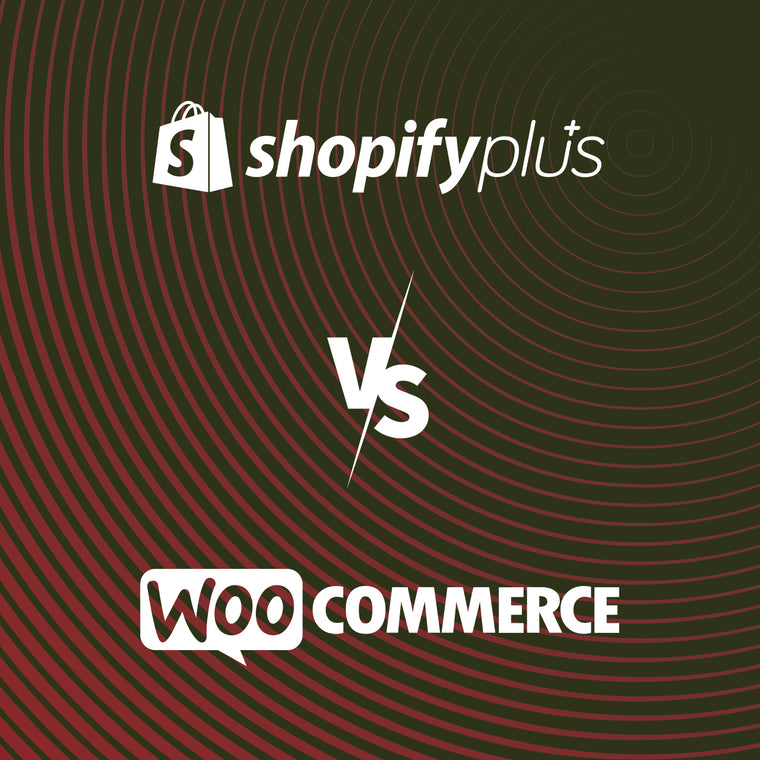Shopify Plus vs. WooCommerce: Which Platform is the Best for My Business?
In the ever-expanding world of eCommerce, choosing the right platform for your business is crucial. Two of the leading contenders in this arena are Shopify Plus and WooCommerce.

While Shopify Plus has long been recognised as a powerhouse in the industry, WooCommerce has been steadily gaining popularity among eCommerce businesses. As a result, the competition between these two platforms has intensified, leaving business owners wondering which one is the best fit for their needs.
How are WooCommerce and Shopify Plus Similar?
Despite their differences, WooCommerce and Shopify Plus share several notable similarities in terms of features and functionalities. Firstly, both platforms boast functional marketplaces that offer a wide array of themes and templates, allowing users to customise the appearance of their Shopify store to align with their brand identity. Additionally, both platforms offer a range of apps and extensions, enabling users to extend the core functionality of their online stores and add features such as a payment gateway, inventory management systems, and marketing tools.
Secondly, WooCommerce and Shopify Plus are specifically tailored to cater to the needs of online stores and professionals, providing comprehensive solutions for managing products, orders, and customer data.
Lastly, both platforms offer a wide collection of integrations with popular third-party tools and services, facilitating seamless connections with marketing platforms, analytics tools, and fulfilment services, among others. These shared features make WooCommerce and Shopify Plus versatile and adaptable choices for businesses seeking to establish a robust online presence.
You can find out more about our eCommerce store and Shopify Plus services at Absolute Design here.
What are the Key Differences Between WooCommerce and Shopify Plus?
When it comes to key differences, WooCommerce and Shopify Plus have their distinct advantages and characteristics. Firstly, in terms of ease of use, WooCommerce operates as a plugin for WordPress, which means users should have some familiarity with WordPress to effectively navigate and manage their online store. On the other hand, Shopify Plus offers a more user-friendly experience with its intuitive interface and simplified setup process.
Secondly, when it comes to themes, Shopify Plus provides a wide selection of professionally designed themes that are responsive and visually appealing. In contrast, WooCommerce offers a vast collection of themes, but the quality and consistency may vary since they are developed by different third-party providers.
In terms of integrations and plugins, WooCommerce has an extensive library of plugins, giving users the flexibility to customise their online store with specific functionalities. Shopify Plus, on the other hand, offers a curated selection of integrations and apps that have been thoroughly vetted, ensuring a higher level of compatibility and reliability.
Regarding SEO, WooCommerce leverages the powerful SEO capabilities of WordPress, which include robust optimisation options, customisable permalinks, and advanced SEO plugins. Shopify Plus, while offering solid SEO features, may not have the same level of customisation as WooCommerce.
When it comes to customer support, Shopify Plus provides 24/7 dedicated support for its users, offering assistance via various channels. WooCommerce, being an open-source platform, relies on community forums, documentation, and third-party support for user assistance.
In terms of pricing, WooCommerce is a more cost-effective option since it is free to use, but users will need to consider expenses related to hosting, themes, and plugins. Shopify Plus, being a fully hosted solution, offers a more comprehensive package but comes with a higher price tag.
Lastly, both platforms provide marketing tools, but Shopify Plus offers an integrated suite of marketing features, including abandoned cart recovery, discount codes, and built-in analytics. WooCommerce relies on third-party plugins and extensions for similar functionalities.
Considering these differences, business owners should evaluate their specific needs, technical expertise, budget, and desired level of support to determine which platform, WooCommerce or Shopify Plus, aligns better with their goals and requirements.
Need help building a successful Shopify Plus store?

What are the Pros and Cons of WooCommerce?
WooCommerce, as an eCommerce platform, offers several advantages and disadvantages that users should consider. One of the primary pros of WooCommerce is its customisability and flexibility. Users have the ability to tailor their online stores to meet specific design and functionality requirements, providing a personalised shopping experience for customers.
Another advantage is the vast selection of extensions available for WooCommerce. These extensions expand the platform's capabilities, offering features such as advanced inventory management, subscriptions, and multi-channel selling options. Moreover, WooCommerce has a strong focus on security, with regular updates and dedicated efforts to address vulnerabilities, ensuring the safety of both customer data and the online store itself.
However, there are some cons to consider as well. One limitation is that WooCommerce can only be used on websites hosted by WordPress. If you have a site hosted on a different platform, you won't be able to use WooCommerce as your eCommerce solution.
Additionally, while WooCommerce itself is free to use, many of the extensions and premium features come at a cost. Users may need to invest in paid extensions to access specific functionalities, which can increase the overall expense. Another potential drawback is that installing too many plugins on WooCommerce can impact the performance and memory usage of the website, leading to slower loading times and potential compatibility issues.
Additionally, the burden of maintenance and security updates falls to the site owner to manage as WooCommerce is a self-hosted platform.
Considering these pros and cons, businesses should carefully evaluate their specific needs, technical capabilities, and budget to determine if WooCommerce is the right eCommerce platform for their online store.
What are the Pros and Cons of Shopify Plus?
Shopify Plus, as a robust eCommerce platform, offers several advantages and disadvantages that businesses should consider. One of the notable pros of Shopify Plus is its customisability, particularly when it comes to the checkout process. Users can tailor the checkout experience to match their brand identity and optimise it for increased conversions, providing a seamless and branded shopping experience for customers. It is an upgrade from Basic Shopify and Advanced Shopify.
Additionally, Shopify Plus provides a Merchant Success Program, offering resources, guidance, and tools to help merchants achieve success in their online businesses. This programme equips users with valuable insights, industry best practices, and strategies to enhance their sales and marketing efforts.
Furthermore, Shopify Plus is known for its excellent customer support. Users have access to 24/7 dedicated support via various channels, including live chat, email, and phone, ensuring that any issues or questions are promptly addressed. These pros contribute to the appeal of Shopify Plus as a customisable, supported, and successful eCommerce platform.
Shopify Plus includes its proprietary Shopify Payments system, but it also supports a wide range of other payment gateways, with the caveat that an additional transaction fee may apply if you opt to use a third-party gateway. This fee is waived for Shopify Payments users.
It must be said, although Shopify Payment fees tend to be higher, they have worked extensively to increase conversions when using Shopify Payments. In fact, the overall conversion rate outpaces the competition by up to 36% and by an average of 15%, and the use of Shop Pay as one of the accelerated payment options lifts conversion by as much as 50%.
How Absolute Design Can Help?
Whether you select Shopify Plus or WooCommerce as your preferred platform, we can help with the design, planning and development, and support of your website. Have a look at our Shopify platform services that we can provide for large and small businesses alike, and get in touch with our Shopify developers for more information.
